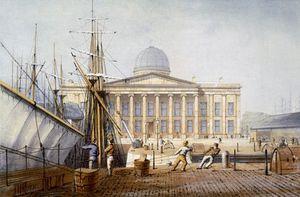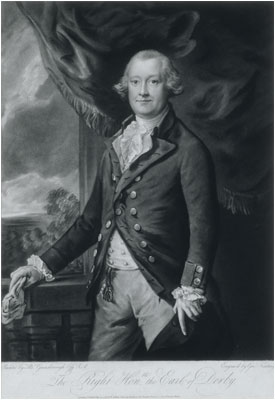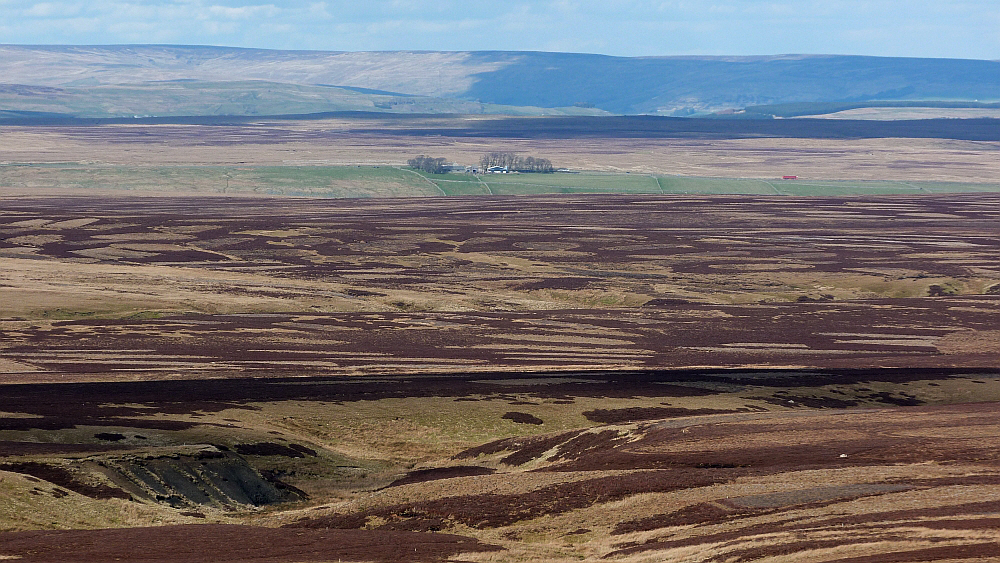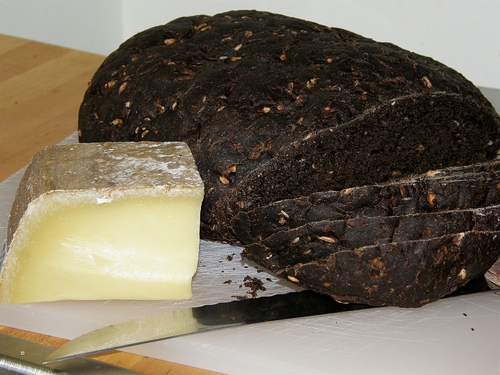CHAPTER I. 1794 until 1811. This first chapter contains some of the few, very few, details about Josh’s family. In part it covers Josh’s “ half-gipsy, half-sportsman life led on Stanemoor” [his words] up in Cumbria. It is so fantastical that it probably owes more to C19th romantic novels rather than real life. He was, without doubt, highly successful in business leaving an estate of £140,000 when he died in 1871 [a modern equivalent of just over £ 97m.] Whether he really managed to get there from a few shillings in his pocket in 1811, or was rather creating a rags to riches story is almost irrelevant.

Joshua Walmsley was born September 29, 1794, in Concert Street, Liverpool His father was a builder, a man of considerable ability and enterprise, whose affairs prospered during the boy’s early childhood. He had extensive premises in Berry Street, and possessed quarries of freestone in Toxteth Park, and of marble in Kilkenny. Many fine buildings were erected by him in Liverpool. Mrs. Walmsley is described as a woman of energy and ability. On one occasion, when her husband was absent for two years in Ireland, she managed his affairs so skilfully that on his return he found them in a more prosperous condition than when he left. A girl, one year the boy’s junior, completed the household.
Among the reminiscences of early days recorded in the notes Sir Joshua Walmsley has left, is the vague recollection of a large workshop filled with busts, statues, and architectural ornaments, where he and his sister used to carry on their merry games, and where on one occasion, with the help of his little playmate, he carved a monumental stone for a deceased favourite cat. These were happy days, but trouble came in the shape of family dissension and failing business; the husband and wife separated, and the children were sent to Christleton, near Chester.
Here the brother and sister attended a day-school, but their real intellectual food was supplied from another quarter. The people with whom they lodged were connected with the stage. Shakespeare’s plays were the constant study and theme of conversation in the house, and before the lad could read well, he was able to declaim long passages from the tragedies and comedies, and before he understood the meaning of the word history, Julius Caesar, Coriolanus, Henry V., and Richard III. were living heroes to him.
At the end of two or three years the children returned to Liverpool, and were sent to day-schools, but the candid record tells how young Joshua was self-willed and impetuous, chafing against discipline, and not a very diligent scholar. “ One day,” he says, “ my schoolmaster chastised me brutally. My father’s indignation on seeing the bruises was roused to such a pitch that he horsewhipped the man who had inflicted them. I never forgot this. From that day I gave up my vagrant habits, and love for my father was deepened by gratitude.” In spite of all his shortcomings, the keen-sighted old man discerned signs of character that pointed to a bright future for his son. “Jos will be Mayor of Liverpool,” he used to say in the boy’s hearing.
To be mayor of his native town was the highest dignity the Liverpool builder’s imagination could picture, and this faith in his son brightened the latter years of his life. The boy, whose ambition had been kindled by reading and learning Shakespeare’s plays, listened with a swelling heart to these predictions. “ They sank into my soul,” he says, “ and I resolved that the day should come when they would be fulfilled.”
In his own old age. Sir Joshua, alluding to his father, writes : “ I do not know any earthly gratification I would have enjoyed more than ministering to his declining years, and witnessing his joy when seeing me fulfil those predictions which his own trust in me had no slight influence in bringing about the realisation of.”
Joshua was next sent to Knowsley School, where he spent the three brightest years of his boyhood. There he formed many life-long friendships, none of which was more fruitful of happiness than that of his future brother-in-law, Mr. James Mulleneux. Of Mr. Baron, the master, he speaks with affection and respect.

We have some pleasant glimpses of this school life and its play hours. A favourite amusement of the boys was to make apple-pies with fruit and flour bought out of their own pocket-money. They dug ovens in the ground, heated them, and baked their pastry. No doubt dirt was an ingredient of the composition, but it mattered little. The pies were relished by the young cooks with a gusto that no feast or fare of after years could boast. Knowsley School stood on the borders of Knowsley Park. One day, while the boys were intent on their apple-pie making, a quaint but elegant old gentleman made his appearance. His carefully-brushed hair hung down in an elaborate cue. He wore silk stockings, silver buckles, and a beautifully-cut coat The grave aristocratic manner of this stately presence awed the boys, and they paused in their pie-making operations. Presently, however, their shyness wore off, for the gentleman seated himself on a large stone in their midst, and began talking to them like any ordinary mortal.
It was the Earl of Derby. The boys had often heard of him, for (be it understood we are speaking of four generations back) he was famed for his love of cock and dog fighting and other sports. [At a dinner party in 1778 held on his estate “The Oaks” in Carshalton, Lord Derby and his friends planned a sweepstake horse race, won the following year by Derby’s own horse, Bridget. The race, the Epsom Oaks, has been named after the estate since. At a celebration after Bridget’s win, a similar race for colts was proposed and Derby tossed a coin with Sir Charles Bunbury for the honour of naming the race. Derby won, and the race became known as the Derby Stakes.]
He questioned the lads about their cooking, and gave them culinary hints which, when followed, improved the flavour of their pies. After that he often came to see them, and the boys would gather round him and listen to his anecdotes and advice. Then rising to leave he would tip the lads all round. Needless to say that the old gentleman with the grand genial manners became a great favourite. Little did the son of the Liverpool builder then foresee that he would one day become acquainted with the earl’s son, would work in the House of Commons with his grandson,[who was Prime Minister three times] and in his latter years be on a friendly footing with his great-grandson, the present Earl of Derby. But the pleasant days at Knowsley were coming to an end. The terms at Mr. Baron’s school were too high for Mr. Walmsley’s reduced means. With a sad heart his son received the tidings that he must leave Knowsley School for one in Westmoreland.
Eden Hall, as the establishment was called, merits a brief description, as a type now unknown in England. From twenty to twenty-five pounds per head was the yearly sum paid by one hundred and thirty boys for board, lodging, and education. ” Breakfast at Eden Hall,” writes Sir Joshua, “consisted of a slice of black rye bread, a large proportion of bran entering into the composition. As a rule it was sour. In addition, a large boiler was placed on the table half filled with water, and into this two gallons of milk had been poured, and some handfuls of oatmeal added. Its contents were shared by the one hundred and thirty hungry lads.  Sometimes oatmeal porridge replaced the contents of the boiler, and a teaspoonful of treacle was allowed as a great treat. Three times a week we had a limited amount of meat for dinner ; on other days, potatoes, black bread, and cheese. This cheese had grown so hard with age we nicknamed it ‘ wheel- barrow trundles’ ; the third meal consisted of another slice of bread and of the ‘ trundle ‘ cheese. For a certain number of hours daily we were turned into agricultural labourers, working on a large farm belonging to our master. We were a healthy set,” continues Sir Joshua, “ our constitutions hardened by outdoor life and labour. Some boys complained, some ran away, but none were ill, and only one death occurred during the six years I stayed there.”
Sometimes oatmeal porridge replaced the contents of the boiler, and a teaspoonful of treacle was allowed as a great treat. Three times a week we had a limited amount of meat for dinner ; on other days, potatoes, black bread, and cheese. This cheese had grown so hard with age we nicknamed it ‘ wheel- barrow trundles’ ; the third meal consisted of another slice of bread and of the ‘ trundle ‘ cheese. For a certain number of hours daily we were turned into agricultural labourers, working on a large farm belonging to our master. We were a healthy set,” continues Sir Joshua, “ our constitutions hardened by outdoor life and labour. Some boys complained, some ran away, but none were ill, and only one death occurred during the six years I stayed there.”
The neighbouring orchards naturally suffered from the inroads of this healthy and hungry tribe. One instance of these exploits to show the spirit that animated the school. ” A magnificent crop of apples attracted the boys’ attention. They were in a neighbouring farmer’s orchard. The temptation was very great, so the robbery was planned and fully carried out. Being the prime mover in the affair and principal leader, I assumed the most dangerous post. Another boy and myself were still in the tree, throwing the fruit down to our accomplices, when the infuriated owner, who had been on the look-out, appeared amongst us. All fled save we two unfortunate delinquents up in the tree. The farmer leant his burly form against the trunk, but we refused, like Mrs. Bond’s ducks, to come down to be killed. Both parties held out for some time. At last terms were agreed upon between us. The farmer was to forgive the offence if I, from my retreat in the branches, pledged myself in the name of the whole school never to molest his property again.
The promise was given, and the pledge accepted. We came down, returned to our schoolmates, and in presence of all assembled, the transaction was related and ratified. A law was passed that for the future property belonging to this farmer should always be respected. This edict would have been obeyed to the letter, but next morning the farmer came to the school and made his accusation before the master, picked out the two chief culprits, and demanded our punishment. A mitigation of the sentence was offered if we gave up our accomplices ; but this we refused to do, and we were flogged. The next day the farmer’s orchard was bare of fruit, and one of his finest trees lay full length upon the ground. The masters themselves looked leniently upon the act, as one of retributive justice consequent on a breach of contract.”
The pupils of the school contested matches in football, cricketing, and other games, with the townspeople, and in the majority of cases came off victorious. At all times Westmoreland has been noted for its wrestling, and to excel in this, as in other sports, was a point of honour with the school. When one of their number was declared by his master to be their best man in muscle and address, he would march into the town and throw down his gauntlet in presence of the inhabitants. This consisted in pulling the bell in the public market-place, and waiting there till a rival champion appeared.
The sound of the bell was perfectly understood by the townsfolk. It was a challenge to any antagonist who would offer himself for the best of three falls. The match was conducted in the most friendly manner, with perfect good humour, and the beaten lad went home to town or school to practise again, and when ready to toll the market -bell once more.
In 1807, young Joshua was rapidly mastering what advantages the school afforded, when the tidings reached him that his father was dead. It had been some time since the lad had seen him; but when they had been last together a circumstance occurred which, though trifling, was destined to have an influence on his whole life, and be in a manner the key-note of all his future conduct. He writes : ” My father and I were walking down the Wavertree Road together, when we entered an orchard where the trees were laden with fruit. Taking up a stone, I threw it into a small ill-grown tree, bearing some wretched crabs, but it brought nothing down. My father stooped, picked up the stone, and threw it into another tree, the apples of which were very fine. Two or three fell at his feet. ‘My lad,’ he said to me, pointing to them, ‘ remember through life that an apple is as easily felled as a crab.’ This occurred the last day my father and I were together, but his simple words produced an impression upon me that was never forgotten.”
The father left no fortune, and thus at the respective ages of thirteen and twelve the brother and sister found themselves penniless on the world. They became teachers in the schools where they had been pupils. This exposed him to bitter mortifications, and many a lonely hour did the boy spend upon the moors brooding over his situation. One day as he mused in this melancholy mood, his father’s words flashed with sudden significance across his mind — “Remember, lad, an apple is as easily felled as a crab.” At once his resolve was made ; life seemed suddenly to have an aim ; duty, however irksome, should be fulfilled, every spare hour should be devoted to self-culture. He would bear sneers and insults with what patience he could command, keeping ever in view the higher standard of life his father’s words were intended to convey. His determination was rigidly carried out, and it was not long ere the sneers and jests had to make way for respect and trust on the part of teachers and pupils.
Soon after, Mr. Ainslabie, the head master, entrusted him with the school accounts, and also assigned to him the task of making out the bills for the boys’ parents. This extra labour, although it brought with it no remuneration, gave him a practical knowledge which was of much value to him in after life. It brought him also into constant direct intercourse with the head master, and this in its turn led to a new phase in the lad’s existence, which tended still more to develop in him powers of self-denial and self- reliance. We shall let him tell the incident that led to this new epoch in his career.

” Once past the small town of Kirkby-Stephen, the country extended for miles in heather-covered moors. Thickly tenanted with grouse, they stretched wild and desolate for a great distance towards Bowes. Mr. Ainslabie shot over these moors, and one day took me with him to carry his spare gun. We had gone a weary way, and the sportsman had not yet had one successful shot. Mr. Ainslabie at last sent me to the other side of one of the tarns to flush grouse for him. A party of gentlemen, with guns, dogs, and keepers, were strolling over that part of the moor. One of them, perceiving me, stepped forward and asked me did I not know I was trespassing, and that I had no right to walk about carrying a gun ? Quite unembarrassed, I explained my position, said I had not fired a single shot, but was simply carrying my master’s gun. My interlocutor dismissed me with a caution, and showing me the boundary line bid me not trespass again, even though I should not fire a shot.
 The gentleman who thus addressed me was, strange to say, Lord Stanley, son of the kind old earl of my Knowsley school-days. However, it happened that before I reached the limit of the forbidden ground a grouse rose at my feet. The temptation was great; in an instant my finger was on the trigger. I fired, and to my delight and surprise the grouse fell. I heard a loud laugh behind me ; all my sportsman instincts were aroused. I resolved to try my luck again. Keen eyesight and unerring precision served my turn, and with my single gun I brought down three brace of grouse. Great was the astonishment of Mr. Ainslabie, who, waiting for me, had shot only one brace, when I appeared and laid the spoil at his feet ! ”
The gentleman who thus addressed me was, strange to say, Lord Stanley, son of the kind old earl of my Knowsley school-days. However, it happened that before I reached the limit of the forbidden ground a grouse rose at my feet. The temptation was great; in an instant my finger was on the trigger. I fired, and to my delight and surprise the grouse fell. I heard a loud laugh behind me ; all my sportsman instincts were aroused. I resolved to try my luck again. Keen eyesight and unerring precision served my turn, and with my single gun I brought down three brace of grouse. Great was the astonishment of Mr. Ainslabie, who, waiting for me, had shot only one brace, when I appeared and laid the spoil at his feet ! ”
The vision of a new quarry now opened upon the master. The steady aim and cool nerve of this young fellow must be turned to account. Grouse and fish fetched good prices in the market, and a dead shot at Eden Hall would be a valuable acquisition. Forthwith young Walmsley was sent to the moors to turn his talent to account. They stretched far and wide towards the north, the sweeping shadows of the clouds alone varying the purple monotony of the heather, with here and there a black tarn full of fish that no one thought of disturbing. Thus Sir Joshua describes his life among the moors :
” My gun, ammunition, a bag wherein to bestow the game, a luncheon consisting of a slice of black bread and a piece of wheelbarrow trundle cheese, composed my equipment, and very soon the funds of Eden Hall so profited by my gun, that instead of the day being spent on the moor and the night in my bed in the dormitory, it came to pass I was sent of on excursions of a fortnight’s duration. A donkey cart was allotted to me to carry the ammunition and a considerable amount of black bread and trundle cheese. A companion, by name Francis, was also given me. This Francis was the “Smike “ of Eden Hall. He a tall athletic lad of respectable parentage, whose father, having placed him in the school, completely neglected him. After some time, from pupil he became the drudge of the establishment, performing all the repulsive work of the place It was a lucky day for poor Francis, that on which that Mr. Ainslabie found out my sporting capacities ; for to spend days and nights on the moors was release from captivity for our ‘Smike.’ His duty was to carry the gun and fishing-gear.
We dragged the tarns by night, and when a goodly cargo of grouse had been shot Francis would harness the donkey to the cart, and taking charge of game and fish, would deliver all to the head master. We got no share of the booty, but if our provisions were exhausted, Francis would receive a fresh supply of black bread and trundle cheese, with which he would rejoin me at our headquarters on the moor. It was usually by the side of a stream or by one of the tarns that we encamped. The donkey unharnessed found his own provisions during the daytime, while at night he would be tethered near. If the weather was fine we slept in the open, if wet or windy we turned the donkey-cart and slept under its friendly shelter. By sunrise we were afoot again, and after a bath in the stream, and a breakfast of black bread and cheese hard as flint, on to our hunter’s life again. Each meal consisted of the same unvarying fare washed down with water. Scrupulously, as if the master’s eye had counted every bird and fish, we sent home all the game we killed. Between each campaign I returned to the school-room, studied, taught, and had charge of the bills.”
We got no share of the booty, but if our provisions were exhausted, Francis would receive a fresh supply of black bread and trundle cheese, with which he would rejoin me at our headquarters on the moor. It was usually by the side of a stream or by one of the tarns that we encamped. The donkey unharnessed found his own provisions during the daytime, while at night he would be tethered near. If the weather was fine we slept in the open, if wet or windy we turned the donkey-cart and slept under its friendly shelter. By sunrise we were afoot again, and after a bath in the stream, and a breakfast of black bread and cheese hard as flint, on to our hunter’s life again. Each meal consisted of the same unvarying fare washed down with water. Scrupulously, as if the master’s eye had counted every bird and fish, we sent home all the game we killed. Between each campaign I returned to the school-room, studied, taught, and had charge of the bills.”
We suspect that this Spartan life in the wild moorland did more to fit young Walmsley for the future that lay before him than could any school or college of the time. When the two lads that shared it together met in later years, one was a knight and a member of parliament, the other – the humble Smike -a prosperous magistrate.
In the spring of 1811, a misunderstanding between young Walmsley and his master’s brother brought this chapter of his career to a close. The lad longed for a wider field of action than the Eden Hall School opened the prospect of, yet he would have waited longer ere taking the decisive step had not this quarrel occurred.
“One morning, in the spring of 1811, carrying all my worldly goods — they were not a heavy load — I bade farewell to Eden Hall. I travelled by carrier as far as Kendal, then took an outside seat on the conveyance that at Warrington met the Liverpool coach. After I had paid my fare but a few shillings remained in my pocket. Yet my heart beat high with hope as I turned my face towards the scene of my future labours ; and all the way I seemed to hear my father’s words : ‘Jos will be mayor of Liverpool some day.’ “
